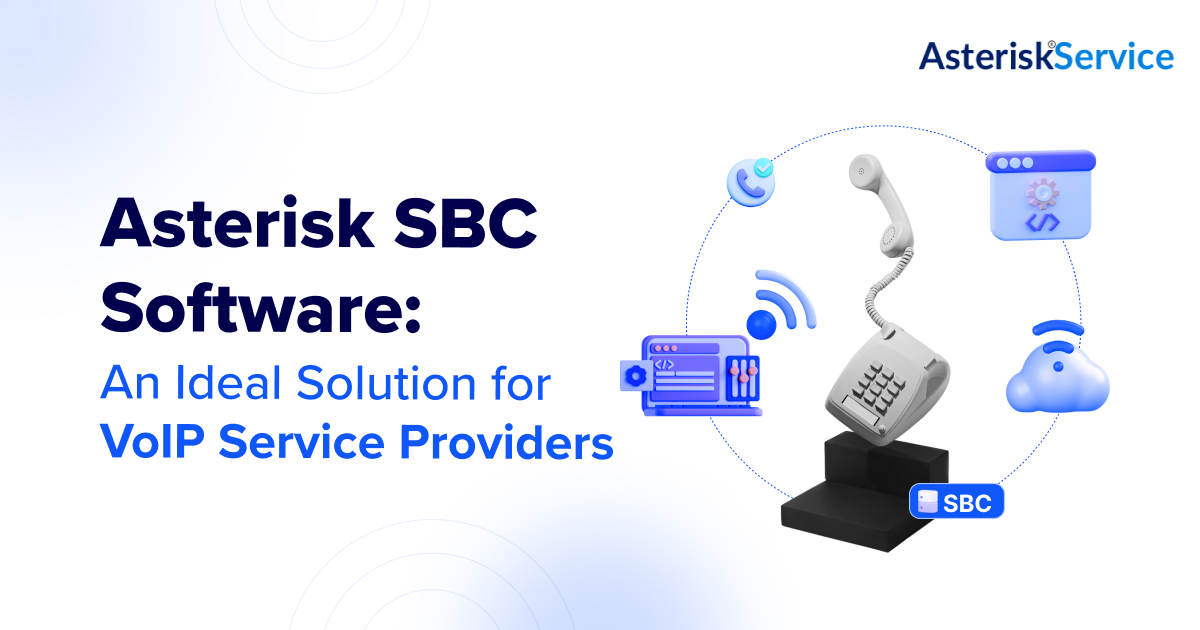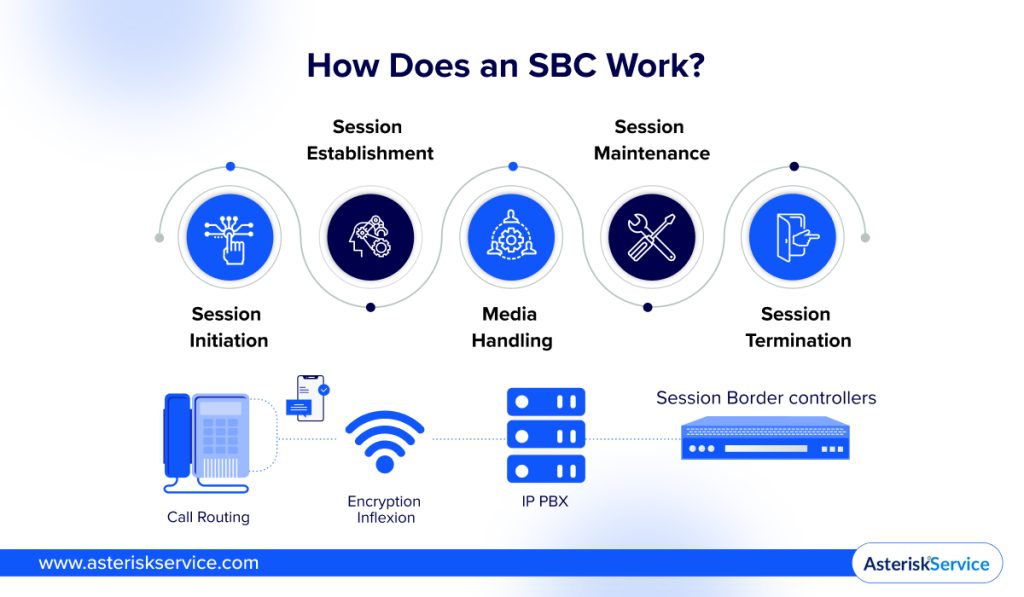
With the growing Internet usage, many businesses are adopting VoIP services to manage their communication systems efficiently. Several VoIP service providers offer customized, cost-effective, and feature-rich PBX services to businesses of various types and sizes. Despite the cost-effectiveness and versatility of Internet services, they are also more prone to security attacks. These services need high security to eliminate the chances of DoS (Denial of Service), DDoS (Distributed Denial of Service), and other attacks. Here comes the role of the Asterisk SBC solution. The Session Border Controller (SBC) solution assures service providers and their customers peace of mind. Before going into the details about the Asterisk SBC software solution, let’s find out precisely what an SBC solution is and how it works.
What is an SBC & How It Works?
A Session Border Controller (SBC) is a network function that secures the VoIP (Voice over Internet Protocol) infrastructure. It acts like a firewall for VoIP. SBCs are usually employed in enterprise infrastructures or any carrier network offering commercial, residential, business, fixed-line, or mobile VoIP services. The solution is generally deployed at the demarcation points (borders) between one part of a network and another.
Key Functions of SBC
- Security: SBCs protect against various threats, including unauthorized access, eavesdropping, and fraud.
- Call Routing: They enable efficient routing of calls to ensure optimal path selection and reduce latency.
- Encryption: Encrypted VoIP traffic to safeguard sensitive information.
- Media Transcoding: Converts media streams to ensure compatibility between different network components.
- Policies: Enforces policies related to call admission control, bandwidth management, and quality of service (QoS).
- SIP Conversions: Translates between different SIP (Session Initiation Protocol) versions and extensions.
- DTMF Detection: Ensures accurate detection and handling of DTMF (Dual-Tone Multi-Frequency) signals.
Embracing SBC technology is pivotal for organizations looking to maintain robust and efficient VoIP networks.
History of SBCs
The evolution of SBCs began in the early 2000s, addressing the need for security and interoperability in VoIP networks. Initially, SBCs were simple devices focused on essential call control and security functions. Over time, SBCs have evolved to handle more complex functions, including advanced security features, media transcoding, and policy enforcement. Today, SBCs are integral components of modern VoIP and UC environments.
As VoIP technology advanced, the need for more sophisticated SBCs grew. Modern SBCs now support high availability (HA) configurations, load balancing, and failover mechanisms to ensure continuous service delivery even in case of failures. These advancements have made SBCs indispensable in both enterprise and carrier-grade VoIP deployments.
How Does an SBC Work?
SBCs ensure secure and efficient communication across the network by monitoring the signaling and media streams. Here’s a detailed look at how an SBC functions:
1. Session Initiation
Session initiation is the first critical phase in establishing a VoIP call, where signaling messages are exchanged to set up the communication session.
- Signaling: When a VoIP call is initiated, signaling messages (such as SIP INVITE) are sent to set up the call. If needed, the SBC intercepts these messages and performs security checks and protocol adjustments.
- Authentication: The SBC authenticates the users involved in the call to prevent unauthorized access.
2. Session Establishment
Session establishment follows the initiation phase, focusing on resolving network traversal issues and enforcing policies that govern the call.
- NAT Traversal: SBCs handle Network Address Translation (NAT) traversal issues, allowing calls to pass through firewalls and routers without problems.
- Policy Enforcement: The SBC applies policies for call routing, quality of service, and other parameters to ensure optimal session performance.
3. Media Handling
Media handling is a vital phase where voice data, or media streams, are managed and optimized for compatibility and security.
- Transcoding: If the endpoints use different codecs (e.g., G.711 and G.729), the SBC transcodes the media streams to ensure compatibility.
- Encryption: The SBC encrypts the media streams to secure the communication against interception and tampering.
4. Session Maintenance
Session maintenance involves ongoing management and optimization of call quality and resource usage throughout the VoIP session.
- QoS Management: Throughout the call, the SBC monitors and manages the quality of the media streams, adjusting parameters as needed to maintain call quality.
- Resource Allocation: The SBC ensures efficient use of network resources by managing bandwidth and other resources dynamically.
5. Session Termination
Session termination is the final phase where the VoIP call is concluded, and all resources are released.
- Call Teardown: When the call ends, the SBC handles the teardown process, ensuring all resources are released and the session is closed correctly.
- Logging and Reporting: The SBC logs call details and performance metrics for reporting and troubleshooting purposes.

SBCs dynamically manage resources and monitor call quality throughout the session, ensuring optimal performance. At the end of the call, SBCs handle session termination and log relevant details for reporting and troubleshooting, solidifying their importance in modern VoIP infrastructures.
The Role of SBCs in Cloud Communications Services
In the era of cloud communications, SBCs play a crucial role in ensuring secure, reliable, and high-quality service delivery. They manage and control VoIP traffic, protecting against security threats and ensuring interoperability between different VoIP systems. SBC solutions are vital for maintaining service quality and security in cloud-based communication services.
SBCs also enable seamless integration of various communication services within the cloud infrastructure, such as voice, video, and messaging. They ensure all these services can interact smoothly without compromising security or performance. This capability is essential for businesses that rely on unified communications (UC) solutions to enhance productivity and collaboration.
Why Asterisk SBC Stands Out in the VoIP Industry
Among several SBCs, the Asterisk SBC solution is considered an industry standard. The solution helps resolve various issues caused by firewalls and NAT for VoIP calls and allows users to control the types of calls they can make via the networks. The Asterisk SBC software solution can customize various high-tech solutions to meet specific requirements of different industries.
Asterisk SBC stands out due to its flexibility and extensive feature set. It supports various codecs, protocols, and network configurations, making it suitable for diverse VoIP. Additionally, the open-source nature of Asterisk allows for extensive customization and integration with other systems, providing a tailored solution for each unique deployment.
Benefits of Using an SBC
SBCs serve as gatekeepers, managing network data flow and addressing numerous challenges, from NAT traversal to security threats. Integrating SBCs into your VoIP infrastructure can significantly enhance performance and protect your communication channels. Some of the key benefits of the SBC software solution include:
- Resolves NAT traversal of firewalls: SBCs handle NAT (Network Address Translation) traversal issues, ensuring seamless VoIP communication across different network boundaries.
- Easily handles interoperability issues: SBCs facilitate interoperability between different VoIP systems, protocols, and codecs.
- Provides flawless routing: Ensures optimal call routing to minimize latency and enhance call quality.
- Ensures high security: Protects against various security threats, including DoS and DDoS attacks, eavesdropping, and fraud.
- Comprises an inbuilt authentication feature: Verifies the identity of users and devices to prevent unauthorized access.
- Assures disaster recovery: Provides mechanisms for service continuity in case of network failures or disasters.
- Offers encryption for privacy: Encrypts VoIP traffic to safeguard sensitive information and prevent call interception.
- Facilitates inbuilt diagnostics: Includes tools for monitoring and diagnosing network and call quality issues.
Deploying an SBC within your VoIP network is a strategic move that offers numerous advantages, from enhanced security and interoperability to improved call quality and disaster recovery. Embracing SBC solutions can significantly contribute to your VoIP services’ overall success and reliability.
Asterisk SBC vs. Traditional SBC Solutions: Comparative Analysis
This comparison highlights the critical differences between Asterisk SBC and Traditional SBC Solutions, catering to different organizational needs and preferences.
| Feature/ Aspect | Asterisk SBC | Traditional SBC Solutions |
| Cost | Generally lower cost, open-source solution | Typically, higher cost, often commercial licenses |
| Customization | Highly customizable, open-source flexibility | Limited customization, dependent on vendor |
| Deployment | Flexible deployment options suitable for SMEs | Often designed for larger enterprises |
| Scalability | Scalable with proper configuration | High scalability, built-in enterprise features |
| Support and Maintenance | Community support, option for paid support | Vendor-specific support, usually robust |
| Security | Depends on configuration; additional modules | Strong built-in security features |
| Interoperability | Good with open-source tools, requires tweaking | Excellent with significant vendors and standards |
| Feature Set | Extensive with add-ons, modular architecture | Comprehensive, integrated feature set |
| Performance | Variable, dependent on hardware and config | Consistent, optimized for performance |
| Ease of Use | The steeper learning curve for beginners | User-friendly interfaces, vendor training |
| Vendor Lock-In | No vendor lock-in, open-source benefits | Possible vendor lock-in due to proprietary tech |
| Update Frequency | Frequent updates, community-driven | Regular updates, vendor-driven |
| Reliability | High with proper configuration | Generally high, enterprise-grade reliability |
| Compliance | Can be configured for compliance | Often designed to meet compliance standards. |
| Integration | Easy integration with other open-source tools | Smooth integration with enterprise systems |
Conclusion
Asterisk SBC is undoubtedly one of the most reliable and well-renowned names in today’s telecom and communication sector. Most VoIP service providers find the Asterisk SBC software ideal for protecting and managing communication flow while ensuring excellent network security. Its flexibility, cost-effectiveness, and robust community support make it a standout choice for any VoIP provider looking to enhance their service offerings and ensure the security and reliability of their communications infrastructure.
Given the continued advancements in SBC technology, the future of VoIP and unified communications looks promising. As businesses increasingly move towards cloud-based solutions and digital transformation, we at Asterisk Services help you leverage the capabilities of Asterisk SBC and VoIP providers and prepare for future challenges and opportunities.
FAQs
- What is an SBC, and why is it essential for VoIP service providers?
An SBC, or Session Border Controller, is a crucial network element that manages and secures VoIP calls. SBC solutions are essential for VoIP service providers to maintain call quality, security, and interoperability between different networks. - How does Asterisk SBC software enhance VoIP service quality?
Asterisk SBC software improves VoIP service quality by providing advanced call routing, load balancing, and security features. It ensures that VoIP provider Asterisk solutions can deliver consistent and high-quality call experiences to their users. - Can Asterisk be used as an SBC for VoIP providers?
Yes, Asterisk can be used as an SBC in VoIP networks. Asterisk as SBC offers a flexible and cost-effective solution for managing VoIP traffic, enhancing security, and ensuring seamless network communication.
- How does Asterisk SBC software handle security concerns in VoIP?
Asterisk SBC software addresses security concerns in VoIP by providing encryption, intrusion detection, and prevention mechanisms. It helps protect VoIP communications from eavesdropping, fraud, and other malicious activities.
- Why should VoIP service providers choose Asterisk VoIP software for their SBC needs?
VoIP service providers should choose Asterisk VoIP software for their SBC needs because it offers robust features, flexibility, and cost-efficiency. Asterisk VoIP providers can benefit from a scalable and reliable solution that meets their requirements.